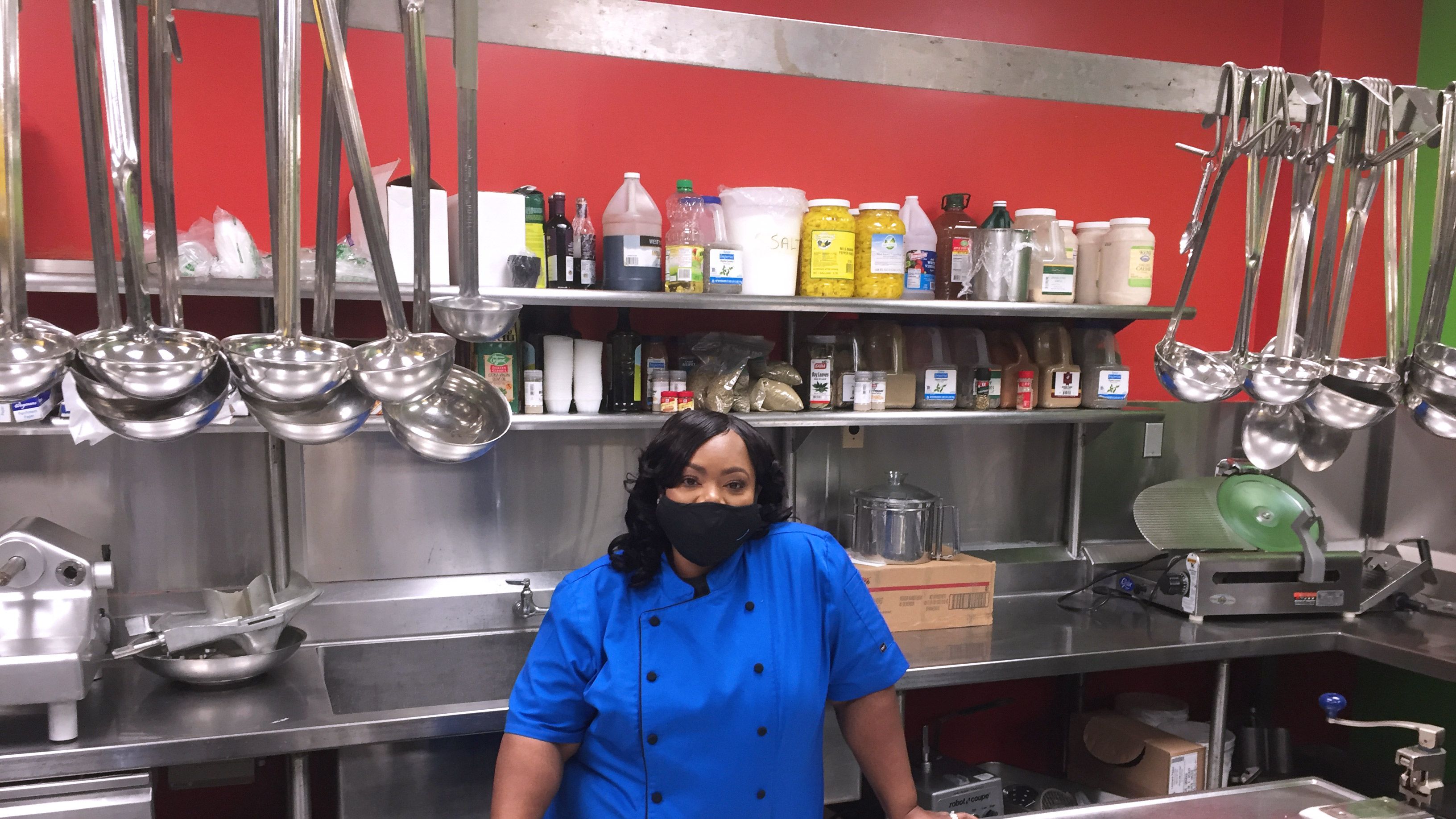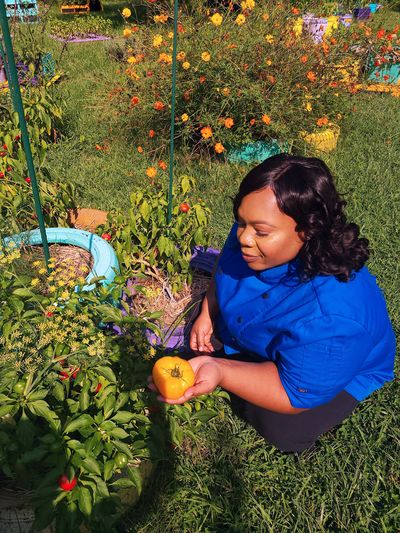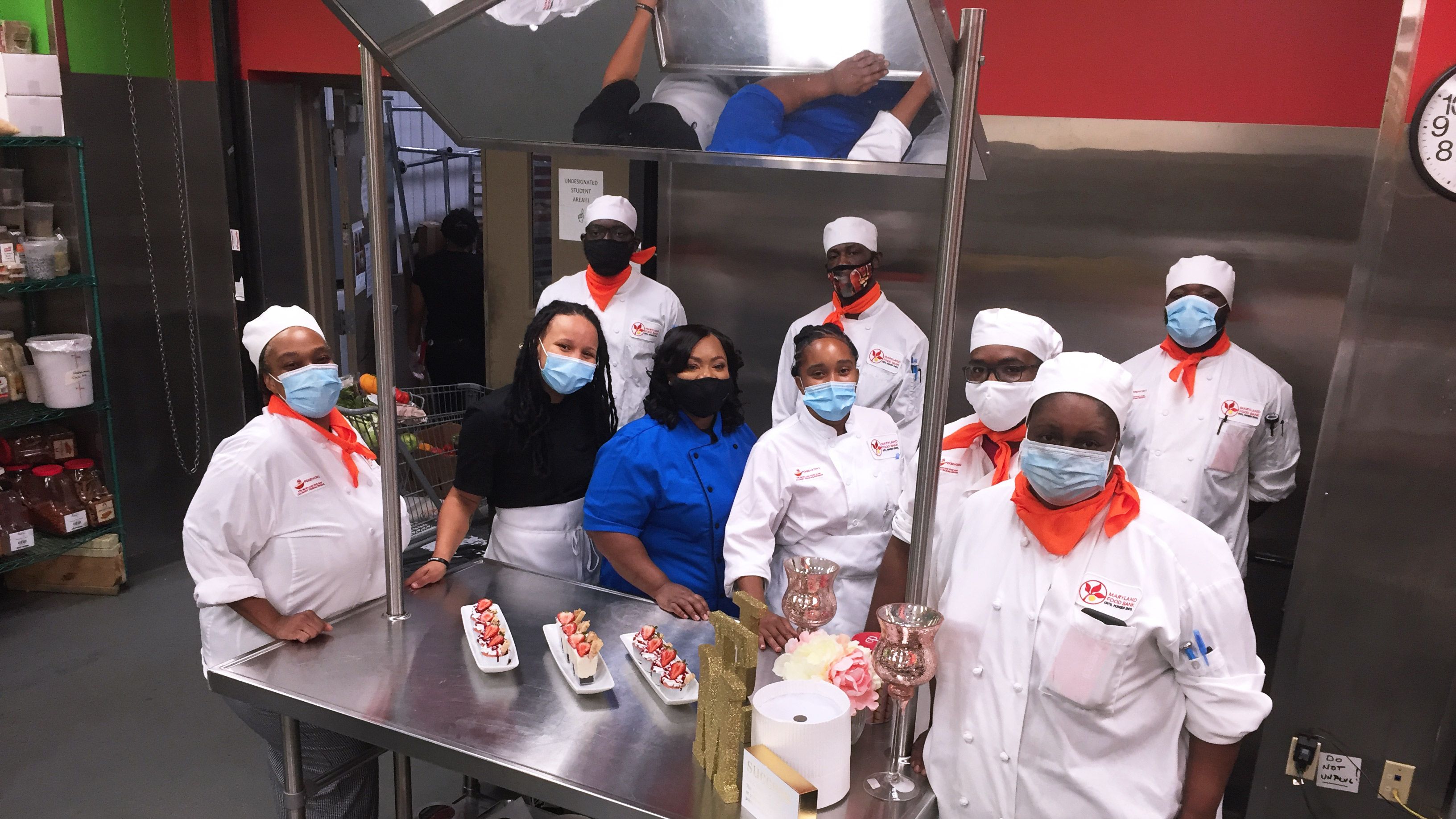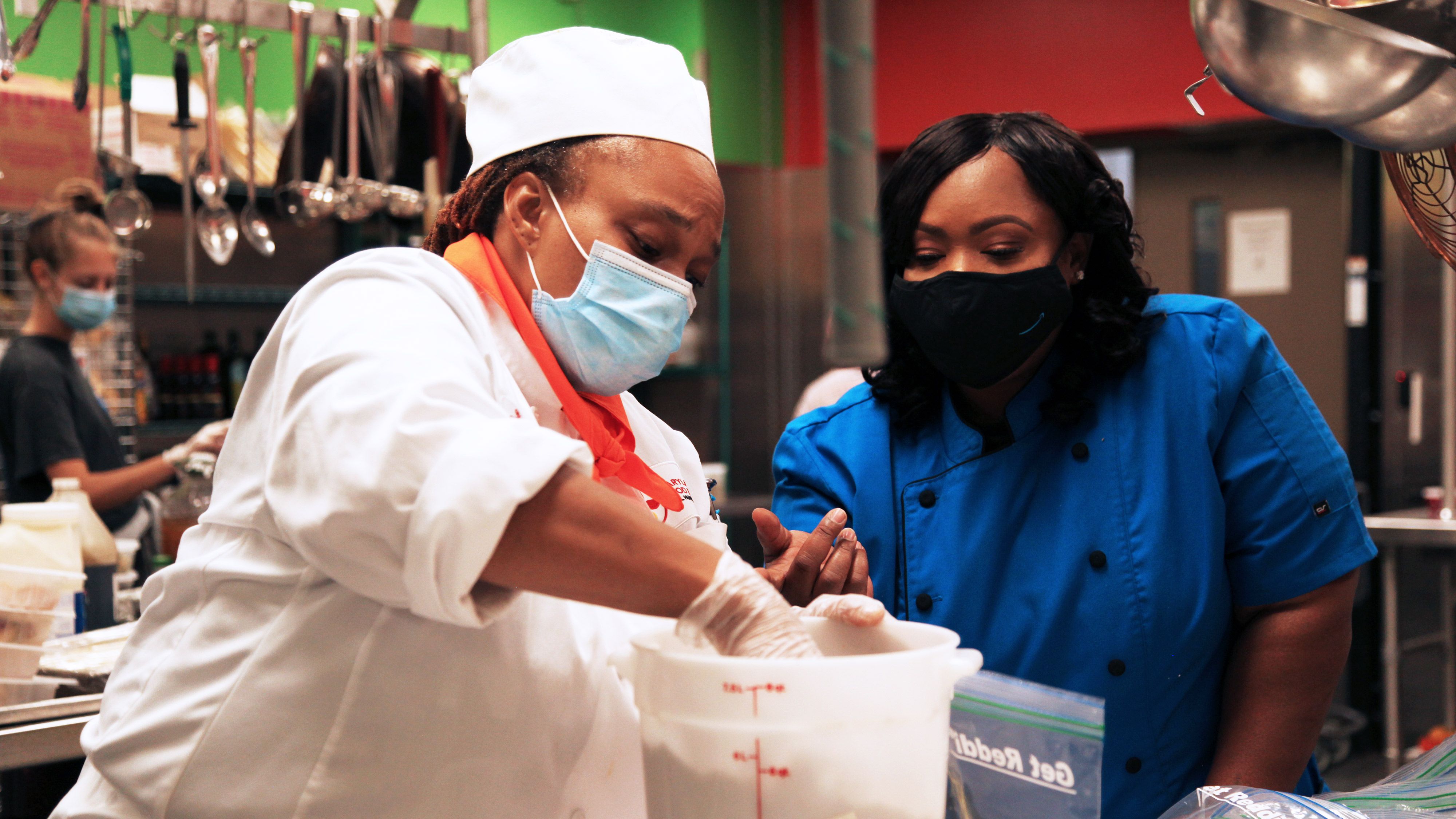This Chef Is Feeding Maryland’s Hungry—in More Ways Than One
Monique Jordan leads a job training program run by the Maryland Food Bank, fighting the state's hunger crisis by helping students learn how to help themselves.


On a recent Friday afternoon, behind their tablets and laptops at home, nine culinary arts students from FoodWorks, the Maryland Food Bank’s job training program, are logged into Zoom, listening intently as their instructor delivers her latest lesson. The topic on today’s menu: Food safety—correct cooking temperatures; thermometer types; food handling, cooling, and storage. Mastering this material is critical. If the students don’t, they’re unlikely to gain a key certification they’ll need to land higher-paying jobs after graduation.
The test for the certification is in a matter of days. Even as the clock ticks toward the weekend, their instructor, Monique Jordan (“Chef Moe” to the class), isn’t letting her students off easy. “Somebody tell me about the two-step cooling process,” she says. The class is silent, thinking. A student pipes up with a partly correct answer. “You got half. Now give me the other half.” More silence. “Come on,” Jordan says firmly. “Somebody help him out.” A woman in the class offers the correct response. “There you go!” Jordan says, smiling. “Awesome.”

'In the Maryland Food Bank’s Education & Demonstration Garden, Chef Moe has access to heirloom tomatoes and other fresh vegetables and herbs for instructional use.'
For many of the low- and moderate-income students in Jordan’s class, the tuition-free program amounts to what feels like their last, best chance at a rewarding career. Participants include those who were once homeless or incarcerated. Others have been chronically un- or underemployed, and almost all, at one time or another, have experienced food insecurity. In its 10-year history, FoodWorks has served more than 300 Marylanders, helping more than 85 percent find work.
In December, Jordan, 41, a veteran culinary arts instructor and executive chef whose past lives include stints as a Hollywood chef and competitor on Bobby Flay’s Throwdown!, became the program’s executive chef and director of culinary arts.
Already, says the food bank’s president and CEO Carmen del Guercio, Jordan “is changing lives.” She’s revamping the program’s 12-week coursework to make FoodWorks more competitive with nearby culinary training schools. She’s also reinvented it to work within the COVID era, integrating material from a nationally recognized online culinary arts curriculum and designing a hybrid version of the course. Two days a week, students learn online. The other three days, they don masks and learn vital hands-on skills in the FoodWorks kitchen. “We’ve been doing this for 10 years, but only since Moe arrived have we been able to professionalize,” FoodWorks executive director Tim Regan says. “She’s raised our game.”
I remember thinking, I don’t ever want to feel this feeling of not being able to eat again. I knew I had to grind harder.
As with other nonprofits fighting hunger, the Maryland Food Bank has been stretched to the brink by the pandemic. The level of need has been staggering. Between March and the end of July, the food bank distributed 25.1 million pounds of food—almost double the 12.8 million it handed out last year.
According to census figures, in August, about 9 percent of Americans surveyed—more than 22 million people—reported sometimes or often lacking enough food to eat within the past seven days. Before COVID hit, 1.5 million Marylanders regularly struggled with food insecurity, unsure of where they’d find their next meal. As rescue funds from the federal government’s CARES Act dry up, and COVID’s economic fallout draws on, Feeding America predicts that another 1 million Marylanders may soon be added to that number.
Get exclusive access to fashion and beauty trends, hot-off-the-press celebrity news, and more.
Jordan knows firsthand what it’s like to suffer the gnawing ache of an empty belly. Nineteen years ago, as a junior culinary arts instructor and single mom of two children under two, at times she fed her daughter and son, put them to bed, and turned in without eating much of anything herself. “Sometimes I’d skip a meal. Sometimes the meal would just be cereal and milk,” she recalls. “Sometimes there was only enough money for daycare or gas or for my kids to eat.”
Times were hard, but clarifying. “I didn’t like that feeling of not being able to provide,” Jordan says. “I remember thinking, I don’t ever want to feel this feeling of not being able to eat again. I knew I had to grind harder. I knew I needed to put myself in a position to earn a higher wage.”
Jordan knew that gaining additional credentials would improve her marketability and base pay. So she doubled down, earning her executive chef certification from the American Culinary Federation in 2000. Studying for the exam tested her stamina. The coursework—composed of material on nutrition, food safety, management, and more—was copious and difficult. Jordan recalls telling her mentor: “I don’t think I can do this. There are words in this nutrition book I can’t pronounce.” She spent hours studying. On her first try, Jordan failed the test by one point. “I cried,” she says. But a few weeks later, she tried again—and passed easily. “I still think about that one point,” she says, “and it drives me every day.”

'Chef Moe (center, in blue) poses with Chef Trainer Christina Wanner and FoodWorks students in the kitchen during their final days before graduation.'
Jordan traces her iron will back to her mom, a single mother and former parking enforcement officer for the city of Wilmington, Delaware, where Jordan grew up. “Every vegetable we ate growing up came from a can,” she says. “I’d never seen an asparagus until I went to school.” And yet Jordan and her siblings never went to bed hungry. Feeding people was a way of life for Jordan’s mom, who spent the hours after her shifts working in a local after school program. The program didn’t provide free meals for its charges, so Jordan’s mom made dinners herself, giant batches of spaghetti with marinara and pepperoni, and her famous macaroni and cheese. “Everybody came down to eat,” Jordan says, “because they knew they’d get a good meal.”
But it was her best friend’s father, the executive chef at Wilmington’s famed Hotel DuPont, who opened Jordan’s eyes to the magic and power of food. At 5, she tagged along on a visit to the Hotel DuPont kitchen. “He gave us a taste of ratatouille,” Jordan remembers. The riot of flavors took the little girl by surprise.
The chef became Jordan’s lifelong mentor. He taught her everything—how to pick fresh ingredients, how to turn out a perfectly cooked steak, and how to teach. “‘Never let your students cut corners,’ he used to tell me, because cut corners become mistakes, and mistakes cheapen your brand.”
Jordan took the message to heart. “I’m hard on my students,” she admits. “But I’m also their biggest cheerleader. A lot of them don’t get that support at home. Some of them have never been pushed. They dropped out of high school, never went to college. Nobody made them work hard. I do. By the end of the program, they’ve earned it. Nobody gave it to them.”
FoodWorks graduate Tiffony Demory, 28, a mother of four girls between the ages of 6 and 12 from Parkville, Md., in northeast Baltimore County, can vouch. Demory had been bouncing between fast food jobs when a friend told her about FoodWorks. She applied and was accepted. But on her first day in January, “I had a little hiccup,” she says. Demory mouthed off in class, and Jordan kicked her out. “She told me ‘I can’t have this negative energy. I want you to be motivated and positive, not sassy and nasty.’” Demory went home, crushed. “I have four girls looking up to me,” she says.

'Chef Moe instructs FoodWorks student Coretta Plater.'
A day or so later, Jordan invited her back. “I came in all ears and less mouth” Demory says. “That’s when I changed a little.” Listening to Jordan tell her own story stirred something within the young trainee. Jordan peppers her lectures with personal anecdotes, tucking in useful tips about healthy eating (“when I make macaroni and cheese, I put some butternut squash or pureed cauliflower in there”) and offering hacks to help her students get the most out of every dollar they spend on food (Jordan breaks down every ounce of meat she buys into smaller portions, dates and labels them, then stores them flat in her freezer to maximize space: “I’m a little bit extra that way.”). Demory wanted to absorb it all. “I was the notebook queen,” she says, obsessed with committing all of Jordan’s knowledge to paper.
Demory’s class paused in March, due to COVID. In early June, after a two-and-a-half-month break, they regrouped online. By the end of the course, Demory was valedictorian. That month, at the small, socially distanced and masked graduation ceremony, she addressed her classmates, tearfully thanking Jordan for giving her a second chance. “She believes in you more than you would even believe in yourself,” Demory says. “I’m starting a catering business because of Chef Moe. I could never repay her for the motivation she gives me daily. This is my dream, my passion, my blood, my sweat, my tears. I’m not going to give up.”
As she listened to Demory’s speech, Jordan held back her own tears. “I love seeing that spark,” she says. “I’ve sat where they’re sitting. I was the girl that got kicked out of Catholic school, the girl who could not comprehend. I lived in low-income housing. I tell my students, ‘Are you going to live this sad sob story that you’re telling, or are you going to live beyond your story? There’s greatness inside of you.’ I want to pull out that greatness.”
She is. One Zoom lesson at a time.
Correction: The name of the American Culinary Federation has been updated.
RELATED STORY

Kristen Mascia is a journalist and editor who writes about health, politics, and people and trends in the zeitgeist. A Brooklyn expat, she and her husband and son now live in the San Francisco Bay Area. Read more of her work at kristenmascia.com.
